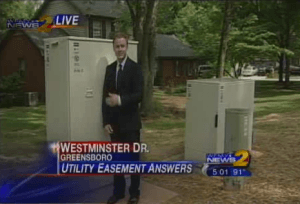A coalition of neighborhoods opposed to the installation of more than 700 4-foot tall metal cabinets across the city of San Francisco have filed suit against AT&T in Superior Court demanding the city follow its own environmental codes and conduct an environmental impact assessment.
The suit comes in response to last month’s close 6-5 vote by the Board of Supervisors permitting AT&T to install up to 726 boxes on the public-right-of-way — typically street corners and sidewalks — to support expansion of its U-verse television, broadband, and phone service.
San Francisco Beautiful, San Francisco Tomorrow, the Potrero Boosters Neighborhood Association, the Dogpatch Neighborhood Association, and the Duboce Triangle Neighborhood Association are all parties to the lawsuit filed Wednesday, which calls the boxes graffiti targets, a safety problem for traffic and pedestrians, and just plain ugly.
Milo Hanke, past president of San Francisco Beautiful, accuses the city of ignoring its own rules to give a green light to AT&T.
“We really don’t want to sue, but we are left with no choice when the city refuses to uphold its own environment codes and is about to give away our sidewalks for the benefit of a private company without objective review,” Hanke told the San Francisco Chronicle.
Long time observers of city politics are frankly surprised AT&T won permission for the controversial boxes.
“It wasn’t that long ago that something like this would have been stopped dead in its tracks in [one] environmental review [after another],” said KCBS-TV reporter Phil Matier. “But this year, whether it’s a change in the tone for business or for jobs it actually got the six votes needed, and that is going to be interesting as this plays out in an election year in San Francisco.”
Lane Kasselman, an AT&T spokesman countered: “This is about choice and competition for San Francisco residents. It’s about new, better technology that enhances peoples’ lives. AT&T thanks the San Francisco Board of Supervisors for supporting the deployment of U-verse throughout San Francisco. We’ve already started construction and are working as quickly as possible to bring next generation IP network services to every block and household that wants it.”
But Hanke thinks the city has gone too far for the benefit of AT&T at the expense of local residents.
“This is a private enterprise with a benefit to private parties,” Hanke told KCBS. “Why should the public be subsidizing a Dallas-based corporation, and having to look at these ugly boxes in the process.”
Sean Elsbernd, who serves on San Francisco’s Board of Supervisors personally thinks the boxes are a great idea, suggesting Comcast needs competition.
“I have a suspicion that four or five months after they are in, people aren’t going to notice them anymore,” Elsebernd said.
[flv width=”640″ height=”380″]http://www.phillipdampier.com/video/KCBS San Francisco Groups Sue ATT 8-24-11.mp4[/flv]
KCBS in San Francisco covers the continuing controversy over AT&T’s 4-foot tall utility boxes and the lawsuit designed to stop or delay their installation. (3 minutes)
[flv]http://www.phillipdampier.com/video/KBAK Bakersfield Homeowner fights utility project in her front yard 5-27-10.flv[/flv]
KBAK in Bakersfield shows what happened when AT&T brought their lawn refrigerator-sized boxes to that city in the spring of 2010 — one woman woke up and found AT&T crews tearing up her yard, without any notice, as part of a major construction project. (3 minutes)


 Subscribe
Subscribe






